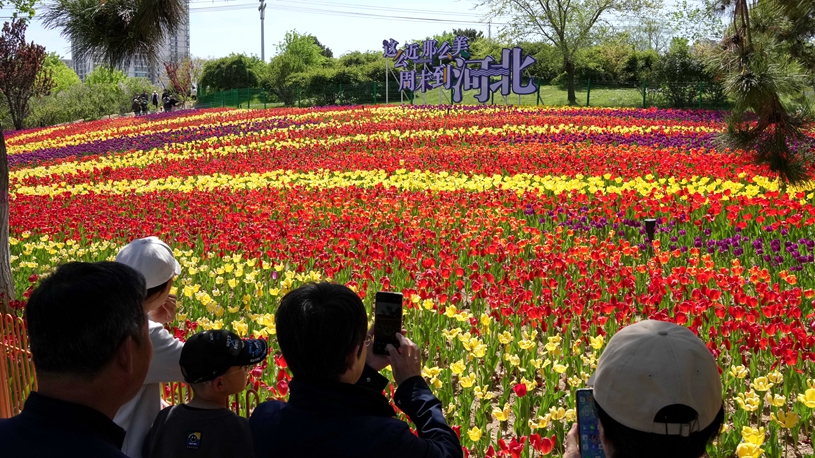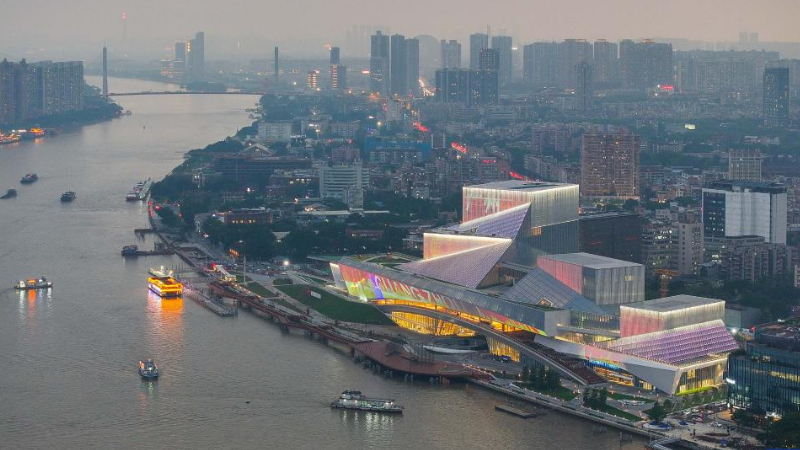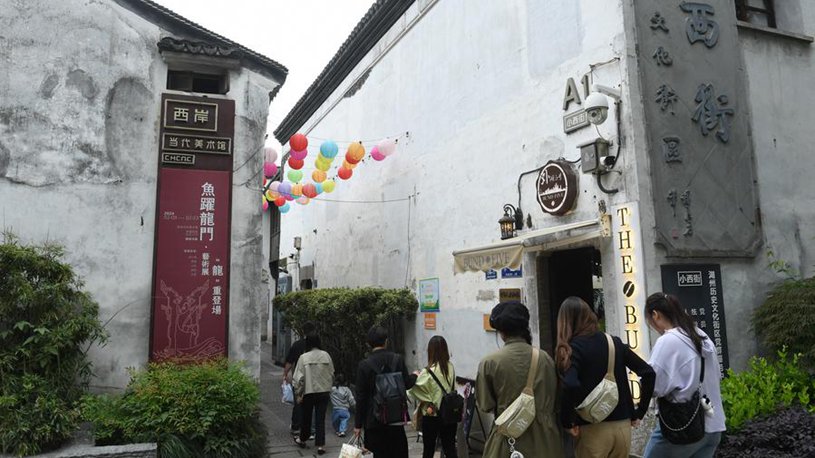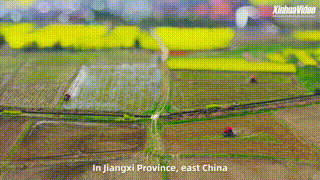
People at a camp for internally displaced persons (IDP) on the outskirts of Goma, eastern Democratic Republic of the Congo, April 11, 2024. (Xinhua/Wang Guansen)
Amid a conflict involving armed rebels in the eastern Democratic Republic of the Congo (DRC), displaced women are facing a heavy toll of sexual violence, trapped between survival, violations and a spiral of tensions that shows little signs of easing.
GOMA, DRC, April 30 (Xinhua) -- Amid a conflict involving armed rebels in the eastern Democratic Republic of the Congo (DRC), displaced women are facing a heavy toll of sexual violence, trapped between survival, violations and a spiral of tensions that shows little signs of easing.
Seated in makeshift dwellings at the Bulengo camp for internally displaced persons (IDPs), about 17 km from Goma, the capital of North Kivu Province, about 20 women have stories that reveal the physical and mental scars they bear.
"I have been raped several times ... There are many of us here at the Bulengo site; in fact, the others just do not want to come out of fear," one woman told Xinhua on condition of anonymity. "If we spoke out, our husbands might leave us. Even if we spoke out, nothing would change," murmured another victim, her voice cracking.
Women who were raped face abandonment by their spouses, who may decide to leave their families out of shame. This situation further traumatizes some victims, who suffer doubly, said Biogi Esperance, head of the alert committee at the Bulengo camp.
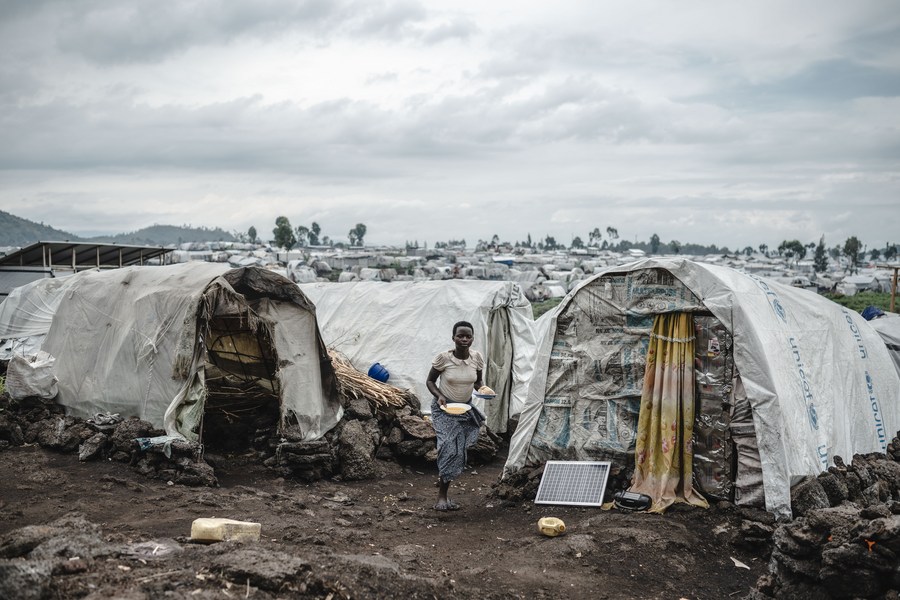
This photo taken on April 11, 2024, shows a camp for internally displaced persons (IDPs), home to tens of thousands of war-displaced people, on the outskirts of Goma, eastern Democratic Republic of the Congo. (Xinhua/Wang Guansen)
Josiane, a mother of six, said that she has been raped several times since last November. She was on her way to the woods a few kilometers away to look for firewood to sell around her tent, where she lives with her family. "There were at least four of us (going to the woods). When the armed men attacked us, each of us ran in a different direction. Unfortunately for me, at least three men chased me and raped me several times until I lost consciousness. It was only a day later that a group of people came looking for me in the woods and brought me back to the camp for treatment," she said.
Josiane said that her 17-year-old daughter had also been raped under the same circumstances in January.
One member of the Bulengo camp management committee said: "The majority of women are victims of rape here in the site generally. People are hungry and have nothing to give to their families, and so they are often victims of sexual abuse."
At the Bulengo camp, located on the road to the town of Sake, the epicenter of fighting between Congolese soldiers and rebels of the March 23 Movement (M23), nearly 1,000 cases of sexual violence have been reported by camp officials since the beginning of this year.
Since 2023, nearly 800,000 people have found refuge in the camp, the majority of whom came from North Kivu's Masisi territory, fleeing the fighting between the military and M23 rebels, who have taken control of large swaths of land.
Local officials say the vulnerability of the displaced caused by lack of food and basic needs gravely exposes women and young girls to unpredictable risks as they are forced to go out to work in the surrounding areas and even into the woods to gather food.
"Every week, we record a minimum of 60 to 90 rape cases reported by the victims themselves to our monitoring committee at the site. The majority of the cases we register come from the vicinity of the displaced sites when women are in the woods searching for vegetables and firewood," Esperance, of the alert committee, said.

Children play in a camp for internally displaced persons (IDPs), home to tens of thousands of war-displaced people, on the outskirts of Goma, eastern Democratic Republic of the Congo, April 11, 2024. (Xinhua/Wang Guansen)
"A TERRIBLE CYCLE"
Peter Chirimwami, military governor of North Kivu Province, said that the province hosts over 2.7 million IDPs who have fled clashes between government soldiers and M23 rebels.
"With this massive influx of displaced people, the situation in the displaced camps around Goma is becoming untenable, with about 10 deaths recorded per day in the camps due to epidemics and insecurity," Chirimwami said in late March.
The DRC military, supported by local militias and a regional force composed of elements from the Southern African Development Community, has been attempting for several months to block the M23's advance toward Goma. The city is now virtually cut off and isolated from the rest of the province by M23 rebels.
The DRC government accuses neighboring Rwanda of supporting M23 rebels, an accusation rejected by Kigali.
The United Nations and regional countries have called on the two countries to seek a peaceful solution to the ongoing crisis. The presidents of the DRC and Rwanda have expressed willingness to negotiate under the mediation of Angola, but specific dates have not yet been fixed.
With fighting between Congolese soldiers and M23 rebels encroaching on the displaced sites, armed groups are fueling sexual violence, a situation highlighted by several organizations providing care to the IDPs.
Many victims interviewed on the site blamed armed groups for the rape against women around the displaced site and elsewhere. Some armed groups' combat positions have been close to the sites for the displaced, on the road between Goma and Sake, for some time.
"There are even armed groups currently finding refuge around the displaced site when they retreat from the combat zone, and that is why even some enemy bombs are now reaching a part of the camp. Cases of kidnappings are regularly reported within the site, and women and underage girls are highly exposed to this situation," said a local civil society official in North Kivu who requested anonymity.
"It is a terrible cycle," the official said. ■

